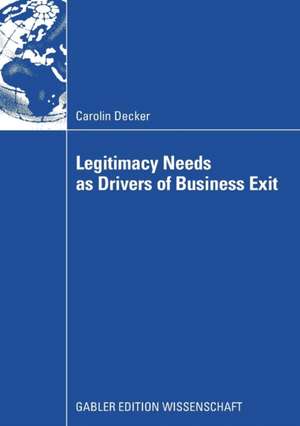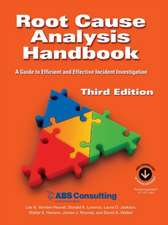Legitimacy Needs as Drivers of Business Exit
Autor Carolin Decker Cuvânt înainte de Univ.-Prof. Dr. Thomas Mellewigten Limba Engleză Paperback – 15 mai 2008
Preț: 381.81 lei
Nou
Puncte Express: 573
Preț estimativ în valută:
73.06€ • 76.44$ • 60.69£
73.06€ • 76.44$ • 60.69£
Carte tipărită la comandă
Livrare economică 03-17 aprilie
Preluare comenzi: 021 569.72.76
Specificații
ISBN-13: 9783834909367
ISBN-10: 383490936X
Pagini: 198
Ilustrații: XVII, 181 p.
Dimensiuni: 148 x 210 x 14 mm
Greutate: 0.27 kg
Ediția:2008
Editura: Gabler Verlag
Colecția Gabler Verlag
Locul publicării:Wiesbaden, Germany
ISBN-10: 383490936X
Pagini: 198
Ilustrații: XVII, 181 p.
Dimensiuni: 148 x 210 x 14 mm
Greutate: 0.27 kg
Ediția:2008
Editura: Gabler Verlag
Colecția Gabler Verlag
Locul publicării:Wiesbaden, Germany
Public țintă
ResearchCuprins
Literature Review.- Theory and Hypotheses.- Methods.- Results.- Discussion.
Notă biografică
Dr. Carolin Decker ist wissenschaftliche Mitarbeiterin von Univ.-Prof. Dr. Thomas Mellewigt am Institut für Management der Freien Universität Berlin.
Textul de pe ultima copertă
A diversified firm’s withdrawal from a business unit, i.e. business exit, is a significant phenomenon in management practice. Although divestitures are highly relevant in practice, the acquisition of business units attracts much more attention in strategic management research.
Carolin Decker develops and empirically applies a framework in which business exits serve the purpose of re-establishing a firm’s previously harmed legitimacy. She suggests four types of legitimacy needs that are to be satisfied with the divestiture of a business unit and the simultaneous pursuit of strategic reorientation. The author tests the theoretical framework with secondary data on 213 business exits. Her findings support the idea that legitimacy needs drive the likelihood of fit-enhancing business exits in divesting firms.
Carolin Decker develops and empirically applies a framework in which business exits serve the purpose of re-establishing a firm’s previously harmed legitimacy. She suggests four types of legitimacy needs that are to be satisfied with the divestiture of a business unit and the simultaneous pursuit of strategic reorientation. The author tests the theoretical framework with secondary data on 213 business exits. Her findings support the idea that legitimacy needs drive the likelihood of fit-enhancing business exits in divesting firms.













